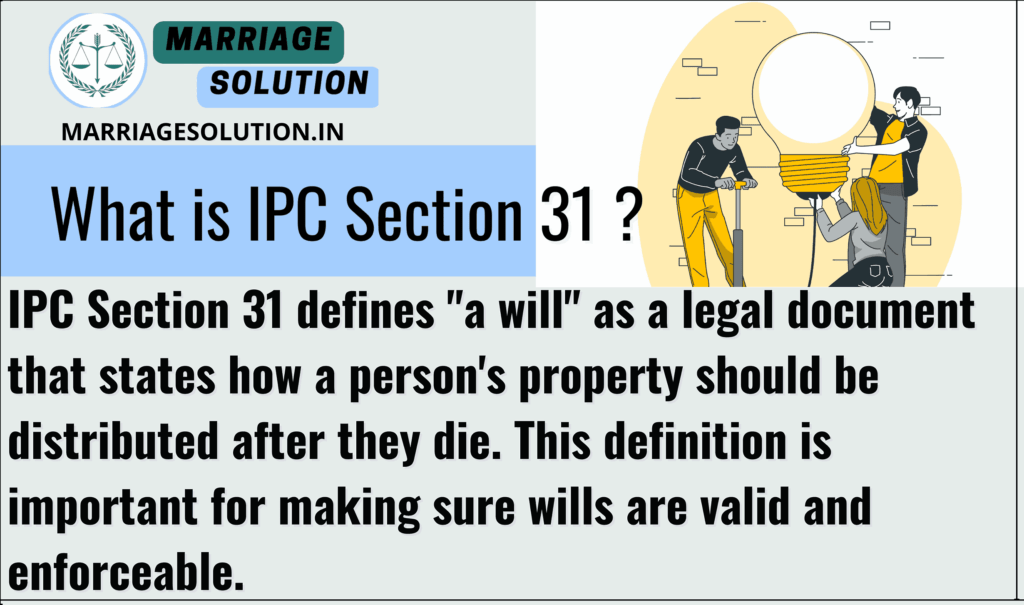Introduction of IPC 31
IPC Section 31 is a crucial part of the Indian Penal Code that defines the term “A will.” This section is essential for understanding various offenses and legal proceedings involving wills. Knowing the definition and implications of “a will” helps in interpreting and applying the law effectively.
What is IPC Section 31 ?
IPC Section 31 defines “a will” as a legal document that states how a person’s property should be distributed after they die. This definition is important for making sure wills are valid and enforceable.

IPC 31 Explain
IPC Section 31 defines “a will” as any legal declaration of a person’s intentions regarding the distribution of their property after death. This definition is significant for determining the legal validity and enforcement of wills.
Key Points Explained
- Definition of a Will:
- A will is a legal declaration of a person’s intentions about the distribution of their property after death.
- This helps in understanding how property should be distributed according to the deceased person’s wishes. For example, if someone writes a will leaving their house to a relative, that document is considered a will.
- Legal Importance:
- The legal recognition of a will is crucial for property distribution.
- It ensures that a person’s property is distributed according to their wishes. This avoids disputes among heirs. For example, a will can specify who inherits family heirlooms or financial assets.
- Creation of a Will:
- A will must be created following legal procedures to be valid.
- This includes being written, signed, and witnessed. Proper creation ensures the will is legally binding. For instance, a will signed in front of witnesses has more legal standing.
- Execution of a Will:
- Executing a will involves carrying out the deceased’s wishes as stated in the document.
- Executors are responsible for managing the distribution of assets. For example, an executor might sell property and distribute the proceeds according to the will.
- Challenges to a Will:
- Wills can be contested in court if there are doubts about their validity.
- Reasons might include claims of undue influence or lack of mental capacity. For example, if someone claims the will was made under pressure, the court can investigate.
- Legal Protection:
- IPC Section 31 provides a framework for the protection of a person’s final wishes.
- This helps prevent fraud and ensure the deceased’s intentions are honored. For instance, laws ensure that a will cannot be easily altered after the person’s death.
IPC 31 Punishment
Punishment under IPC Section 31
- Imprisonment: Offenses related to the fraudulent creation, alteration, or destruction of a will can lead to imprisonment.
- Fine: In addition to imprisonment, offenders may also be fined.
- Combination of Punishments: Depending on the severity of the offense, both imprisonment and fines can be imposed.
31 IPC bailable or not ?
Whether an offense related to IPC Section 31 is bailable or not depends on the specific nature of the crime and the sections of the IPC that describe the offense. Generally, the bailability is determined by the severity of the offense.
Section 31 IPC in short information
| Aspect | Details |
|---|---|
| Definition | IPC Section 31 defines “a will” as any legal declaration of a person’s intentions regarding the distribution of their property after death. |
| Offense | Involves fraudulent creation, alteration, or destruction of a will. |
| Punishment | Can include imprisonment, fines, or both, depending on the crime’s severity. |
| Bailable or Not | Depends on the specific offense and related sections of the IPC. |
IPC 31 FAQs
What does IPC Section 31 define?
IPC Section 31 defines “a will” as a legal declaration of a person’s intentions regarding the distribution of their property after death.
What is the legal importance of a will?
A will ensures that a person’s property is distributed according to their wishes, avoiding disputes among heirs.
What are the legal requirements for creating a valid will?
A will must be written, signed, and witnessed to be legally binding.
Can a will be contested?
Yes, a will can be contested in court if there are doubts about its validity, such as claims of undue influence or lack of mental capacity.
What punishments are associated with offenses under IPC Section 31?
Punishments can include imprisonment, fines, or both, depending on the severity of the offense.
If you need support with court proceedings or any other legal matters, don’t hesitate to reach out for assistance.
Court or any other marriage-related issues, our https://marriagesolution.in/lawyer-help-1/ website may prove helpful. By completing our enquiry form and submitting it online, we can provide customized guidance to navigate through the process effectively. Don’t hesitate to contact us for personalized solutions; we are here to assist you whenever necessary!
